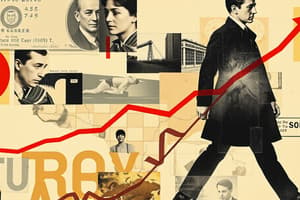Podcast
Questions and Answers
[Blank] unemployment occurs when there is a mismatch of available and required skills, often caused by the introduction of new technology or changes in patterns of consumer demand.
[Blank] unemployment occurs when there is a mismatch of available and required skills, often caused by the introduction of new technology or changes in patterns of consumer demand.
Structural
The main policy used by the RBA to manage inflation is ______ policy.
The main policy used by the RBA to manage inflation is ______ policy.
monetary
A sustained increase in the general level of consumer prices over time is known as ______.
A sustained increase in the general level of consumer prices over time is known as ______.
inflation
When more goods and services are being demanded than the economy can supply, causing prices to rise, it is referred to as ______ inflation.
When more goods and services are being demanded than the economy can supply, causing prices to rise, it is referred to as ______ inflation.
[Blank] unemployment is experienced when people are moving between jobs.
[Blank] unemployment is experienced when people are moving between jobs.
If the RBA is concerned about an economy that is sluggish it will lower ______ rate targets.
If the RBA is concerned about an economy that is sluggish it will lower ______ rate targets.
The ______ measures the percentage change in the price of a basket of goods and services consumed by households.
The ______ measures the percentage change in the price of a basket of goods and services consumed by households.
The proportion of people above a specified age not being in paid employment or self-employment but currently available for work during the reference period defines ______.
The proportion of people above a specified age not being in paid employment or self-employment but currently available for work during the reference period defines ______.
Australia's recent economic growth spiked to 7.4% due to ______ and recession which caused businesses to lay off workers.
Australia's recent economic growth spiked to 7.4% due to ______ and recession which caused businesses to lay off workers.
Cyclical unemployment is caused by a ______ in economic activity or aggregate demand.
Cyclical unemployment is caused by a ______ in economic activity or aggregate demand.
People expect prices to rise buy things now to avoid higher prices is an example of ______ expectations.
People expect prices to rise buy things now to avoid higher prices is an example of ______ expectations.
Economic ______ occurs when an economy increases the output of goods and services produced over a period of time.
Economic ______ occurs when an economy increases the output of goods and services produced over a period of time.
Government policies such as increase in tax on certain goods or services can increase prices is an example of ______ policies.
Government policies such as increase in tax on certain goods or services can increase prices is an example of ______ policies.
According to the provided text to be classified as unemployed, individuals must be ______ seeking work.
According to the provided text to be classified as unemployed, individuals must be ______ seeking work.
The formula GDP = C + I + G + (X – M) includes consumption expenditure, investment expenditure, government expenditure, and net ______.
The formula GDP = C + I + G + (X – M) includes consumption expenditure, investment expenditure, government expenditure, and net ______.
Unemployment is now rising for both cyclical reasons and ______ reasons.
Unemployment is now rising for both cyclical reasons and ______ reasons.
More money leads to higher prices which leads to ______
More money leads to higher prices which leads to ______
The government places tax on ______ to discourage use rising 12.5% per year from 2012 - 2020.
The government places tax on ______ to discourage use rising 12.5% per year from 2012 - 2020.
When the household purchasing power of wages goes down, they may demand a ______ rise.
When the household purchasing power of wages goes down, they may demand a ______ rise.
Seasonal unemployment results from the seasonal patterns of high and low activity in some industries, particularly in primary industry and ______.
Seasonal unemployment results from the seasonal patterns of high and low activity in some industries, particularly in primary industry and ______.
Flashcards
Economic Growth
Economic Growth
Occurs when an economy increases the output of goods and services produced over a period of time.
GDP Formula
GDP Formula
GDP = C + I + G + (X – M), where C is consumption, I is investment, G is government expenditure, X is exports, and M is imports.
Unemployment
Unemployment
Significant economic issues facing an economy when it is not maximizing its use of resources to satisfy wants and needs.
Unemployment Defined
Unemployment Defined
Signup and view all the flashcards
Cyclical Unemployment
Cyclical Unemployment
Signup and view all the flashcards
Structural Unemployment
Structural Unemployment
Signup and view all the flashcards
Frictional Unemployment
Frictional Unemployment
Signup and view all the flashcards
Seasonal Unemployment
Seasonal Unemployment
Signup and view all the flashcards
Inflation
Inflation
Signup and view all the flashcards
Consumer Price Index (CPI)
Consumer Price Index (CPI)
Signup and view all the flashcards
Cost-Push Inflation
Cost-Push Inflation
Signup and view all the flashcards
Demand-Pull Inflation
Demand-Pull Inflation
Signup and view all the flashcards
Overseas Factors (Inflation)
Overseas Factors (Inflation)
Signup and view all the flashcards
Government Policies (Inflation)
Government Policies (Inflation)
Signup and view all the flashcards
Excessive Increase in Money Supply
Excessive Increase in Money Supply
Signup and view all the flashcards
Inflation Management
Inflation Management
Signup and view all the flashcards
RBA's Monetary Policy
RBA's Monetary Policy
Signup and view all the flashcards
Lowering Cash Rate
Lowering Cash Rate
Signup and view all the flashcards
Impact of Inflation on Households
Impact of Inflation on Households
Signup and view all the flashcards
Impact of Inflation on Businesses
Impact of Inflation on Businesses
Signup and view all the flashcards
Study Notes
Economic Growth
- Economic growth happens when there is an increase in the output of goods and services in an economy over a period
- GDP = C + I + G + (X – M) is used to measure the size of the economy
- C, I, G, X, and M stand for consumption expenditure, investment expenditure, government expenditure, exports, and imports respectively
- Economic Growth (%) = X
- During COVID, Australia's economic growth rose to 7.4% due to lockdowns and recession which caused businesses to lay off workers
- Post-COVID boom saw high demand for labour but a shortage of workers because of border closures, migration stopping which led to a low of 3.5% economic growth
- Unemployment is increasing recently due to cyclical and structural reasons, with low economic growth of 0.8%
Unemployment
- Unemployment is a significant economic issue, as it means the economy isn't maximizing its resources
- It is the proportion of people above a specified age who are not in paid employment or self-employment but are available for work
- Unemployment improved substantially after the early stages of the pandemic
- The working age population is people aged 15 and over
- The labour force includes all people aged 15 and over who are employed
- Someone employed has to work for at least 1 hour a week
- Someone unemployed has to be actively seeking work
- Unemployment rate % = x 100
- Particiaption rate % = x 100
Types of Unemployment
- Cyclical unemployment is caused by a contraction in economic activity or aggregate demand
- Cyclical unemployment rose in 2020 to 7.4% due to the Covid recession
- Structural unemployment occurs when there is a mismatch of available and required skills, often due to new technology or changes in consumer demand
- Frictional unemployment happens when workers are moving between jobs
- Seasonal unemployment results from seasonal patterns in some industries, such as fruit picking and ski instruction
Unemployment Rate Trend
- The current unemployment rate is 4.1%
- Underemployment is when people are employed but want more hours; the rate is currently 6%
- Unemployment rose to 7.4% during COVID due to lockdowns and recessions
- After COVID, high labour demand existed, but a border closure-caused worker shortage led to 3.5% unemployment
- Unemployment is now rising due to low economic growth of 0.8% and structural factors like AI replacing jobs
Participation Rate Trend
- Participation rate is currently 67.3%
- Rising because:
- Women entering the work force, high level of skilled workers (migrants)
- Low unemployment encouraging people to enter workforce
- PR rate fell during COVID lockdowns unemployment spiked
- PR rising due to record high due to cost of living causing higher income
Inflation
- Inflation is a sustained increase in the general level of consumer prices over time
- Rapidly rising prices reduce the purchasing power of money
- CPI measures the percentage change in the price of a basket of goods and services consumed by households and is calculated by the ABS
- Inflation = X
Overview of Inflation Trends
- Inflation has mostly been in the 2-3% target range since 1993
- During COVID, prices fell as consumers couldn't spend
- Post-COVID, rapid inflation was due to supply shortages and high consumer demand, peaking at 7.8% in December 2022
- Due to contractionary monetary policy inflation returned to a target of below 3% between 2024-2025
Causes and Types of Inflation
- Cost-push factors: Caused by rise in cost of inputs into production such as raw materials or labour
- Demand-pull factors: More goods and services are being demanded than the economy can supply, causing prices to rise
- Inflationary expectations: People expect prices to rise, so they buy things now to avoid higher prices
- Overseas factors: Imports become more expensive because overseas inflation or the AUD is weak
- Government policies: Government policies, like increasing taxes, can increase prices
- Excessive increase in the money supply: More money leads to higher prices
Impacts of Inflation
- Households: bring purchasing decisions forward. Purchasing power of wages goes down may demand wage rise. Low income earners have less power to get pay rises. Value of saving goes down. Higher rate for unemployment
- Economy: High unemployment. Lower economic growth due to interest rate rises to stop inflation. Trade deficit exchange rate depreciation
- Business: Wages rise, increasing costs of prices. Lower international competitiveness
Managing Inflation by the RBA
- The main policy to manage inflation is monetary policy
- RBA has responsibility for implementing this policy
- The Inflation target is 2-3%
- Monetary policy influences interest rates in the economy
- If concerned about rising inflation they increase cash rate target which causes market interest rates to also increase
- This dampens economic activity as high interest rates are incentive to save and disincentive to borrowing and spending
- RBA will lower cash rate target if they're concerned that economic growth is sluggish and likely to flow below target
- Lower interest rates encourage borrowing and spending and disincentive to save
Effectiveness of Management
- Moderately effective macroeconomic tool
- Increasing the cash rate 13 times has raised interest rates, discouraging businesses and consumers from borrowing
- This decision increased average mortgage repayments by over $1000 per month, reducing consumption
- In December 2022, inflation peaked at 7.8%; the RBA responded by raising the cash rate from 0.1% to 4.35% by November 2023
- Long 6-18 months time log from implantation of cash rate change to reduce inflation
- Monetary policy is a 'blunt instrument' it impacts whole economy rather than specific sector or items
- Make inequality worse as people with debt are hit harder – paying more on mortgage/debt while people with savings receive high interest rates
Studying That Suits You
Use AI to generate personalized quizzes and flashcards to suit your learning preferences.




